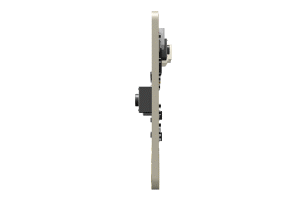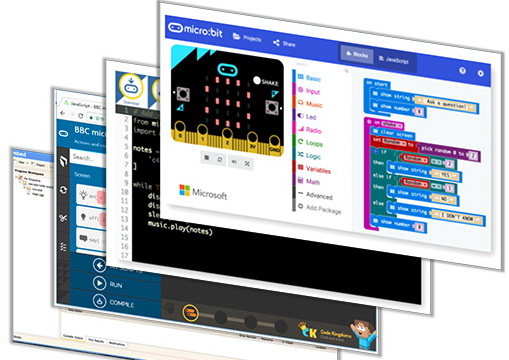Details
BBC micro:bit, a pocket-sized computer to learn programming for kids and beginners
The micro:bit
The BBC micro:bit is an open development board that allows you to run code on it and have access to all of the hardware.

You can use your BBC micro:bit for all sorts of cool creations, from robots to musical instruments – the possibilities are endless. This little device has an awful lot of features, like 25 red LED lights that can flash messages. There are two programmable buttons that can be used to control games or pause and skip songs on a playlist. Your BBC micro:bit can detect motion and tell you which direction you’re heading in, and it can use a low energy Bluetooth connection to interact with other devices and the Internet.
Hardware

- Nordic nRF51822
- 16 MHz 32-bit ARM Cortex-M0 microcontroller
- Bluetooth® 4.0 low energy/2.4GHz RF SoC
- 16kB RAM
- 256kB Flash
- Freescale KL26Z – 48 MHz ARM Cortex-M0+ MCU
- Compass – Freescale MAG3110 3-axis magnetometer, I2C interface
- Accelerometer – Freescale MMA8652 3-axis accelerometer, I2C interface
- Power connector – 3V power supply
- Reset button – reset the system
- Micro USB connector – for connecting PC, download code, serial communication, etc.
- 5x5 LED display – 5x5 LED grid
- Button A/B – programmable buttons
- I/O connection pins – 5 I/O rings and 20-pin edge connector, including SPI, UART, I2C, Analog, PWM, etc.
- Dimensions – 5cm x 4cm
Software

- Supports Microsoft PXT graphical editor
- available on Windows, macOS, iOS and Android
- online programming, needs no more compiler
- download/debug your code on PC via USB
- download/debug your code on mobile devices via Bluetooth
- Supports multi popular languages like Javasript, Phython, Mbed C, etc.
- Microsoft TouchDevelop IDE
- Microsoft Blocks
- CodeKingdoms Javascript
- MicroPython
- mbed enabled
Pinouts



